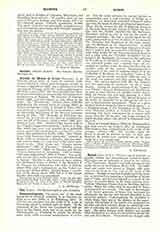

Ricoldo da Monte di Croce (PENNINI), b. at Florence about 1243; d. there October 31, 1320. After studying in various great European schools, he became a Dominican, 1267; was a professor in several convents of Tuscany (1272-88), made a pilgrimage to the Holy Land (1288), and then travelled for many years as a missionary in western Asia, having his chief headquarters at Bagdad. He returned to Florence before 1302, and was chosen to high offices in his order. His “Itinerarium” (written about 1288-91; published in the original Latin at Leipzig, 1864; in Italian at Florence, 1793; in French at Paris, 1877) was intended as a guide-book for missionaries, and is an interesting description of the Oriental countries visited by him. The “Epistole de Perditione Acconis” are five letters in the form of lamentations over the fall of Ptolemais (written about 1292, published at Paris, 1884). Ricoldo’s best known work is the “Contra Legem Sarracenorum”, written at Bagdad, which has been very popular as a polemical source against Mohammedanism, and has been often edited (first published at Seville, 1500). The “Christian Fidei Confessio facta Sarracenis” (printed at Basle, 1543) is attributed to Ricoldo, and was probably written about the same time as the above mentioned works. Other works are: “Contra errores Judieorum” (MS. at Florence); “Libellus contra nationes orientales” (MSS. at Florence and Paris); “Contra Sarracenos et Alcoranum” (MS. at Paris); “De variis religionibus” (MS. at Turin). Very probably the last three works were written after his return to Europe. Ricoldo is also known to have written two theological works—a defense of the doctrines of St. Thomas (in collaboration with John of Pistoia, about 1285) and a commentary on the “Libri sententiarum” (before 1288.) Ricoldo began a translation of the Koran about 1290, but it is not known whether this work was completed.
J. A. MCHUGH

